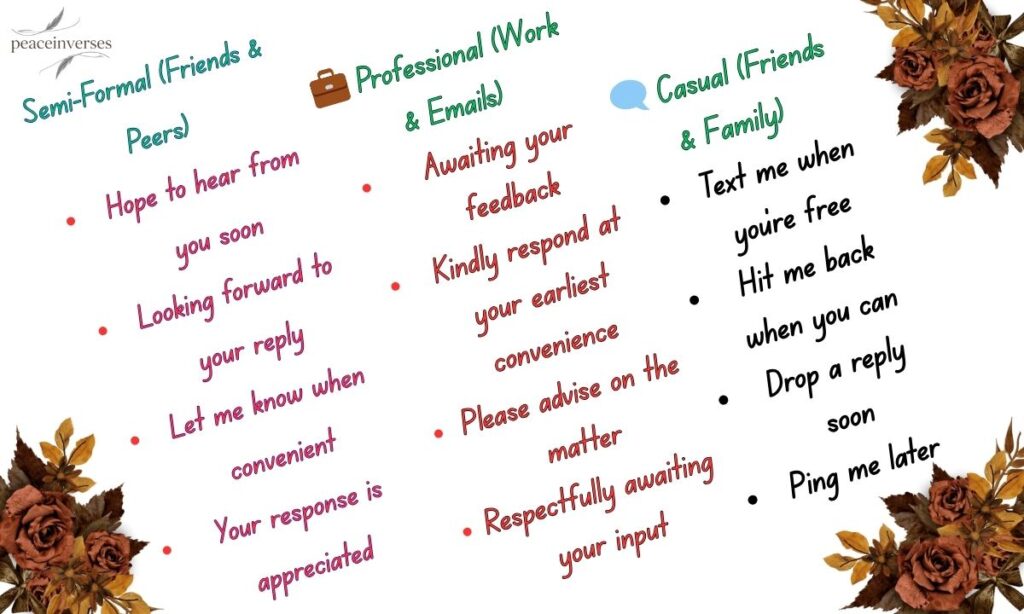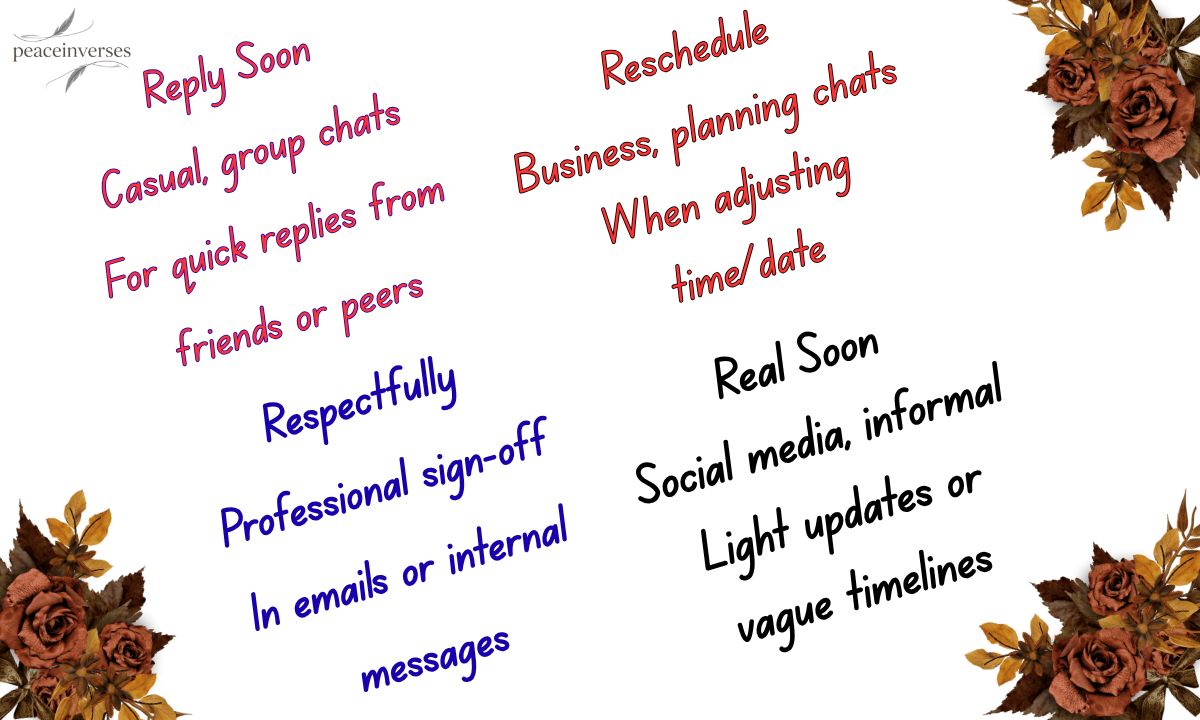Ever stared at a text filled with abbreviations and wondered if you just missed a secret code? You’re not alone. The way we text keeps changing, and every year brings new shortcuts that slip into everyday chats. Some of them feel obvious, others leave you staring at your phone a little longer.
That’s where RS comes in—a tiny combo of two letters that sparks big curiosity. Whether it pops up in your WhatsApp group, a work chat, or an Instagram DM, it can make you pause mid-conversation. If you’ve ever hesitated before replying, this guide is for you. Get ready to feel confident every time you see RS in a message.
Why RS Is Trending in Texting and Digital Chats
People no longer want to type long messages when a few letters will do. Acronyms like RS fit the fast rhythm of today’s digital conversations. They keep chats moving without slowing the reader down. That mix of speed and simplicity is why it keeps popping up in group chats and social platforms.
Another reason RS is so popular is that it can carry tone as well as meaning. A short message like “RS?” can sound urgent, polite, or even friendly depending on how it’s used. It works across group threads, private messages, and even quick work updates. That flexibility has helped it spread far beyond casual texting.
All Main Meanings of RS in Text Messages
The two letters RS are not locked to one meaning. Their interpretation depends on the relationship, tone, and platform of the conversation. In most cases, people use it for quick responses or casual updates. But in professional settings, it often signals respect or scheduling changes.
The most common meanings include Reply Soon, Respectfully, Reschedule, and Real Soon. Each one has its own tone, etiquette, and best context. Understanding these differences can save you from miscommunication or awkward follow-ups.
RS as “Reply Soon” – The Most Common Use
The most widespread meaning of RS is Reply Soon. It’s a convenient way to ask for a quick response without sounding too pushy. People use it in active chats to keep the conversation moving and to signal that they’re waiting for input. It’s polite but still gets across the need for a timely reply.
To make it clear, many add context or a reason. For example: “Sent the report, RS so I can update the team.” This avoids confusion and encourages faster responses. If the message involves deadlines or decisions, it’s better to pair RS with a specific time to avoid misunderstandings.
- When to use: Great for quick follow-ups where the other person already knows the topic.
- Good phrasing: “Invoice attached, RS so I can submit it today.”
- What to avoid: Don’t send just “RS” to someone unfamiliar with the shorthand.
- Sample messages: “Dinner at 7? RS if you’re in.”
- Best platforms: Works best in text, WhatsApp, and Slack chats, not formal email.
RS as “Respectfully” in Formal Conversations
In professional settings, RS can stand for Respectfully and acts as a polite sign-off. It helps keep formal messages short while showing courtesy to the recipient. You might see it in emails or chat apps between coworkers who already understand each other’s texting style.
Still, it’s safest to use the full word Respectfully when addressing clients or higher-ups. Shortening it may appear too casual or even insincere in formal messages. Use RS as a sign-off only in familiar work groups or informal exchanges with trusted colleagues.
- When to use: For quick internal messages where everyone knows the shorthand.
- Professional tip: In first-time or official emails, spell out “Respectfully.”
- Sample sign-off: “I’ll follow the revised plan. Respectfully, Mark.”
- Alternative closings: “Kind regards,” or “Sincerely,” for more formal interactions.
RS as “Reschedule” in Business and Work Chats
Another common use in workplaces is RS for Reschedule. It’s often used when moving meetings or adjusting deadlines. This saves time in quick updates or Slack channels where everyone needs to know about the change. However, it should always be followed by the new date or time to prevent confusion.
When proposing a change, it’s clearer to write something like: “Can we RS to Friday at 3 PM?” This avoids unnecessary back-and-forth. Afterward, always follow up with a calendar invite or confirmation message to keep everyone on the same page.
- Best practice: Pair RS with the new time: “Can we RS our 10 AM to 2 PM tomorrow?”
- Confirm with: “Invite sent for Friday at 3 PM, please confirm.”
- Common mistake: Never send just “RS” in mixed teams or with clients—it can be misread.
- Sample messages: “Meeting moved, RS for tomorrow at noon — please confirm.”
RS as “Real Soon” in Informal and Social Media Contexts
In social chats or on platforms like Instagram and TikTok, RS often means Real Soon. It’s used to hint that something will happen shortly, without promising an exact time. It keeps things casual and relaxed, especially in captions or light updates to friends.
This version works well for informal plans and quick announcements, like “Live stream RS” or “Drop the photos RS.” It’s not the best choice when exact timing matters. If someone needs to be ready or waiting, it’s more considerate to provide a specific ETA instead.
- Where it fits: Works for casual messages and social captions when timing isn’t critical.
- When to avoid: Skip it if the other person needs a precise time, like for pickups or meetings.
- Tone cues: Often paired with emojis, like ⏳ or 🙂, to show it’s casual.
How to Understand RS Based on Context and Tone
Because RS has several meanings, context is everything. Look at who’s sending the message, the platform they’re using, and how quickly the conversation is moving. These clues often reveal whether the sender is asking for a reply, rescheduling something, or just being polite.
Tone also plays a huge role. A single exclamation mark or emoji can shift the meaning. For example, “RS!” may feel urgent, while “RS 🙂” sounds casual. When in doubt, you can always ask for clarification or mirror the sender’s tone to keep things smooth.
Personal vs. Professional Conversations
In personal conversations, RS is often casual. Friends tend to use it for “Reply Soon” or “Real Soon” without much formality. In professional spaces, it usually leans toward “Respectfully” or “Reschedule.” Matching the tone to the relationship is key to using it appropriately.
If you’re unsure, it’s safest to default to full words in professional settings. For example, instead of replying “RS,” you might write, “Please respond by 4 PM.” Among friends, you can keep it short and casual. The relationship and stakes of the message should guide your choice.
- Friend example: “Movie tonight? RS.” — “I’m in. What time?”
- Work example: “Need numbers, RS.” — “I’ll send the report by 4 PM.”
- Quick tip: Mirror the sender’s tone to avoid sounding too formal or too casual.
Clues from Timing, Phrasing, and Platform
Timing often reveals the intended meaning. In fast-paced group chats, RS usually means Reply Soon. In slower, more formal exchanges, it’s often Respectfully or Reschedule. Pay attention to words around it like “meeting,” “confirm,” or “ETA,” which can point to its purpose.
The platform matters as well. Messaging apps like WhatsApp, iMessage, or Instagram lean casual, so RS often stands for “Reply Soon” or “Real Soon.” Workplace tools like Slack, Teams, or email lean more toward “Respectfully” or “Reschedule.” Use all these clues together for the best guess.
- Clue checklist:
- Sender’s role — boss, coworker, or friend
- Platform — email, Slack, or DM
- Pace — quick exchange or slow thread
- Keywords — meeting, confirm, ETA
- Sender’s role — boss, coworker, or friend
When to Use RS – and When You Should Avoid It
RS is most effective when everyone understands it and the stakes are low. It saves time in casual chats or quick work messages. If you’re talking with someone familiar or responding in a fast-moving thread, it’s a handy shorthand.
However, you should avoid RS in messages to clients, executives, or in any situation that requires precise or legally clear language. It can feel too casual or ambiguous in serious discussions. When in doubt, spell out your meaning to avoid confusion or mistakes.
When to Use RS and When to Avoid It
| Situation | Use RS? | Recommended Alternative |
| Chat with close friends | Yes | “RS” or “Real Soon” is fine. Add a time if needed. |
| Fast-moving group chat | Yes, with context | “Invoice sent, RS so I can file it.” |
| Coworker for quick updates | Maybe | Use RS if everyone knows it; otherwise say “Please reply soon.” |
| Scheduling with multiple teams | No | Write “Can we reschedule to Friday at 3 PM?” |
| Message to client or executive | No | Use full wording: “Please respond at your earliest convenience.” |
| Public post or large audience | No | State the exact time: “New post drops at 7 PM.” |
Polite Alternatives to RS for Clear and Courteous Messaging
Politeness in digital chats is about tone as much as words. Sometimes RS feels too abrupt or robotic, especially if you don’t know the person well. A slightly longer phrase can soften the request without slowing the conversation. These alternatives work well in both personal and semi-formal texts.

Using polite wording also shows respect for the recipient’s time. Instead of a blunt “RS,” you can use a phrase that feels warm yet efficient. This approach is useful when texting a neighbor, an online seller, or even a classmate about group work.
Semi-Formal Phrases for Friends, Peers, and Everyday Chats
Semi-formal phrases strike a balance between friendly and respectful. They fit situations where you want a quick answer but still keep the tone thoughtful. These are great for neighbors, colleagues you know well, or casual service inquiries.
Below are hand-picked phrases that can replace “RS” naturally:
- “Looking forward to your reply.”
- “Hope to hear from you soon.”
- “Your response would be appreciated.”
- “Please let me know when convenient.”
- “I’d be grateful for a response.”
- “When you get a chance, let me know.”
- “Can you get back to me on this?”
Professional Alternatives to RS for Work Emails and Business Chats
In the workplace, abbreviations can sometimes confuse or look too casual. Clients and managers often prefer full words that sound clear and respectful. A thoughtful alternative to RS makes you appear polished and considerate.
Professional alternatives also help you avoid misunderstandings. When deadlines or important decisions are involved, a well-chosen phrase can encourage a prompt response without sounding demanding.
Respectful Closings and Follow-Up Requests
Respectful closings show professionalism while keeping your message concise. These phrases are ideal for emails, formal chats, and follow-up reminders to colleagues or supervisors.
Here are effective replacements for “RS” in work settings:
- “Awaiting your feedback.”
- “Kindly respond at your earliest convenience.”
- “Please advise on the matter.”
- “I appreciate your prompt response.”
- “Respectfully awaiting your input.”
- “Looking forward to your confirmation.”
- “Please review and let me know your thoughts.”
Casual Alternatives to RS for Friends and Family Conversations
When you’re talking with friends or family, formality isn’t necessary. You want something quick, friendly, and easy to type. Casual alternatives keep the tone warm without feeling rushed or stiff.
These phrases work best in group chats, weekend planning, or informal reminders:
- “Hit me back when you can.”
- “Drop a reply soon!”
- “Ping me later.”
- “Lemme know what you think.”
- “Text me when you’re free.”
- “Get back to me whenever you’re done.”
- “Shoot me a quick reply.”
15 Real-World Examples of Using RS and Its Alternatives
Examples help you see how these phrases sound in real conversations. Whether you’re texting a friend or emailing your boss, the right choice depends on tone and context.
Here are 15 practical examples that show how “RS” or its alternatives work naturally:
- “Just emailed you the files — RS when possible.”
- “Can we reschedule (RS) our call to Thursday?”
- “Thanks for the update. Awaiting your response.”
- “I’d appreciate it if you could reply when convenient.”
- “Let me know what you think — ping me later.”
- “Your input matters, so looking forward to your reply.”
- “Please review the attachment and respond at your earliest.”
- “Let’s shift our catch-up. Can we RS it to Saturday?”
- “Hey! I shared the invite — text me back when free.”
- “Sent over the document. Please advise.”
- “No rush, just hit me back when you’re done.”
- “It’d be great to hear your thoughts. RS if possible.”
- “Drop a reply soon so we can confirm the booking.”
- “Meeting changed — please confirm the new time.”
- “We’re almost ready — be here RS!”
Common Mistakes to Avoid When Using RS in Text
People often assume everyone knows what RS means, but that’s not always the case. Using it without context can confuse the reader, especially in professional or cross-cultural settings. This can slow down communication instead of speeding it up.
Another mistake is using RS in high-stakes situations like client updates, contracts, or scheduling meetings with senior leaders. When clarity matters most, spell out the request instead of using shorthand.
Mistakes to avoid:
- Using RS without context or explanation.
- Assuming clients or new contacts understand the abbreviation.
- Pairing RS with vague requests like “RS ASAP” without details.
- Using RS in legal or formal documents.
- Overusing RS in group chats, making messages feel pushy.
- Forgetting to add a deadline or specific time when it’s needed.
Final Thoughts
The rise of acronyms like RS shows how fast messaging habits change. Knowing when to use it — and when not to — can make your chats more effective and help you avoid awkward missteps.
By understanding tone, context, and audience, you can choose whether to keep things brief or use a longer phrase. Either way, your communication stays clear, polite, and appropriate for the situation.

